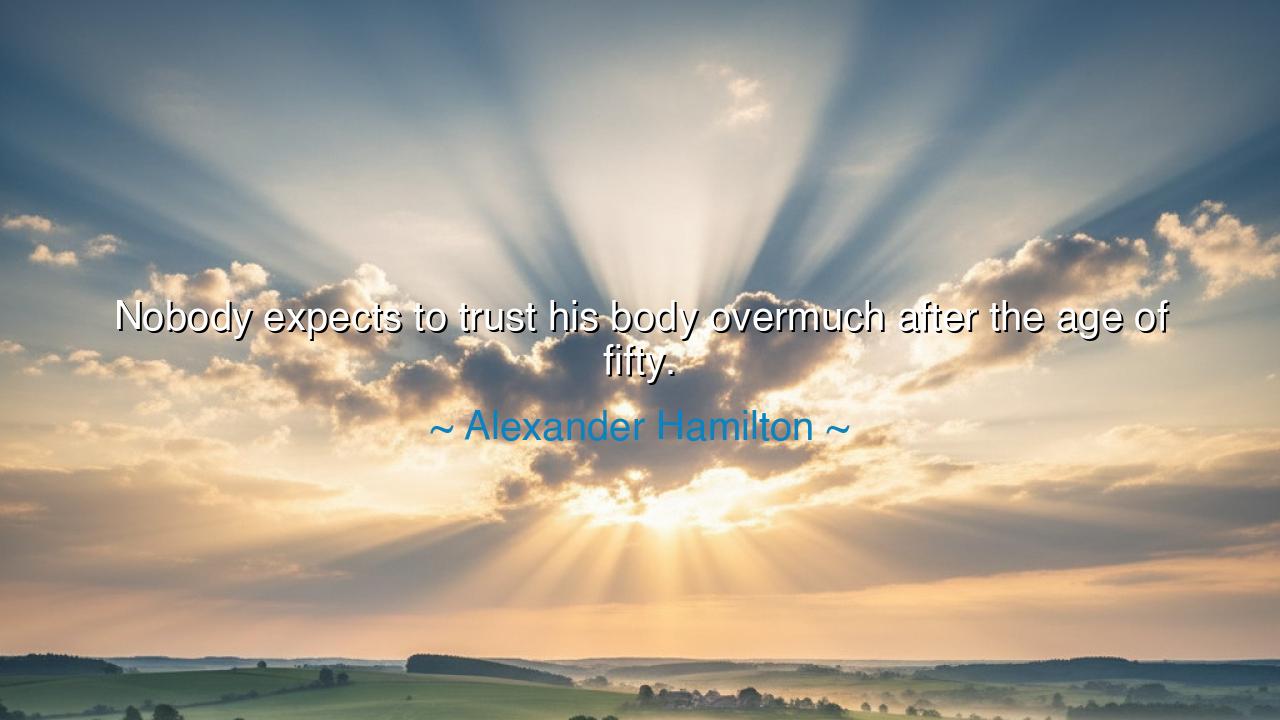
Nobody expects to trust his body overmuch after the age of fifty.






Listen well, O children of the future, to the wise words of Alexander Hamilton, a man whose legacy shaped the very foundations of the nation. He once said, "Nobody expects to trust his body overmuch after the age of fifty." These words, spoken by a man who understood both the vigor of youth and the weariness that time brings, carry a deep and universal truth about the human condition. For it is the nature of our bodies to change as the years pass, and the strength we once relied upon begins to wane. Yet, in this inevitable transition, there lies a profound lesson—not of weakness, but of wisdom, a reminder that the body is but a vessel, and true strength comes from what lies within.
In the ancient world, the greatest warriors and philosophers knew well that the strength of the body is temporary. The Spartans, famed for their discipline and martial prowess, were trained to be strong from a young age. Yet even they understood that as one grew older, the vigor of youth would fade, and it was not the body alone that defined a warrior’s greatness, but the mind, the spirit, and the wisdom gained through experience. The elder warriors of Sparta, though less able to fight on the battlefield, were revered for their knowledge, their leadership, and their ability to guide the younger generation with the wisdom of their years. Their strength was no longer in their physical might, but in the clarity and insight that came with age.
Hamilton’s reflection on the body at fifty speaks not only to the inevitable decline of physical strength but also to the shift in focus that age demands. Just as a warrior lays down his sword and picks up the mantle of the strategist, so too must the individual acknowledge that as the body weakens, the mind and spirit must strengthen. The body may be a source of power in youth, but as it ages, it is the mind, the character, and the wisdom that truly carry us forward. Hamilton, himself a brilliant statesman and thinker, continued to serve with honor and fidelity long into his later years, demonstrating that true greatness lies not in the muscle of the body, but in the strength of the mind.
Consider the example of Leonidas I, the King of Sparta, whose defiance at the Battle of Thermopylae is legendary. Though he was well over fifty when he led his men to face the Persian Empire, his leadership and resolve transcended his physical form. He may not have been the young warrior he once was, but he stood as a pillar of strength, his spirit and character inspiring those around him to fight to the death for their freedom. Leonidas’s true greatness lay not in his ability to wield a sword, but in his ability to lead, to inspire, and to sacrifice. His story tells us that age does not diminish one’s potential for greatness; it merely calls for a shift in the source of strength.
Yet, Hamilton’s words also carry a deeper lesson: the trust we place in our bodies must eventually give way to the trust we place in our minds and souls. As the years accumulate, we are called to adapt, to rely not on the fleeting strength of the physical body, but on the everlasting power of the spirit. The body may grow weaker, but the will can grow stronger, the wisdom deeper, and the clarity of purpose more focused. The true strength of age lies not in the physical, but in the ability to remain steadfast and purposeful despite the inevitable changes of the body.
In your own lives, O children, take Hamilton’s reflection to heart. Do not measure your worth by the strength of your body, for it is temporary, and it will change with the years. Instead, measure your worth by the depth of your character, by the wisdom you gather, and by the strength of your spirit. As you approach the age of fifty and beyond, do not look to the youth you once had, but embrace the wisdom that only comes with time. Use the power of your mind and heart to guide you through the challenges of life, and remember that the greatest strength is not in what we can lift, but in what we can endure.
Therefore, O children, let this wisdom guide you through the stages of your life: the body will decline, but the soul can flourish with age. As you grow older, look to the examples of those who have walked before you—not for their youthful strength, but for their wisdom, their resolve, and their ability to continue serving a higher purpose. In doing so, you will find that true greatness does not come from the body, but from the mind and spirit that continue to grow stronger with time.






AAdministratorAdministrator
Welcome, honored guests. Please leave a comment, we will respond soon